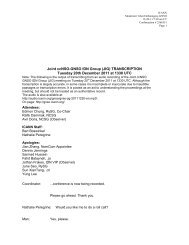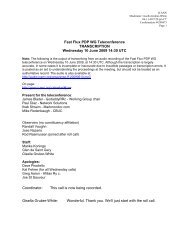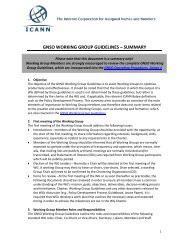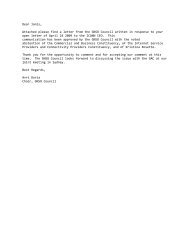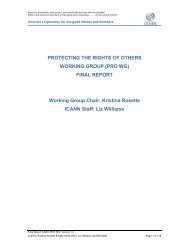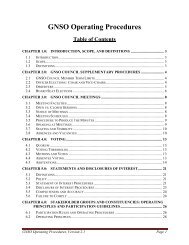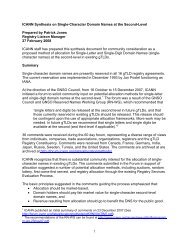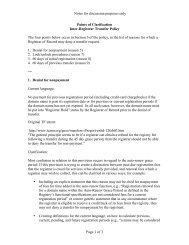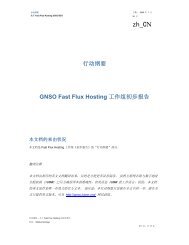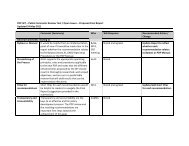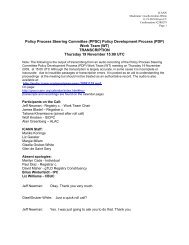Joint SO/AC Working Group (WG) Charter - GNSO - icann
Joint SO/AC Working Group (WG) Charter - GNSO - icann
Joint SO/AC Working Group (WG) Charter - GNSO - icann
You also want an ePaper? Increase the reach of your titles
YUMPU automatically turns print PDFs into web optimized ePapers that Google loves.
The standard <strong>WG</strong> roles, functions & duties shall be applicable as specified in Section 2.2 of the<strong>Working</strong> <strong>Group</strong> Guidelines. The CCI-<strong>WG</strong> shall follow the GN<strong>SO</strong> <strong>Working</strong> <strong>Group</strong> Guidelines.Statements of Interest (<strong>SO</strong>I) Guidelines:Each member of the CCI-<strong>WG</strong> from the GN<strong>SO</strong> is required to submit an <strong>SO</strong>I in accordance with Section 5of the GN<strong>SO</strong> Operating Procedures.Section IV: Rules of EngagementDecision-Making Methodologies:{Note: The following material was extracted from the <strong>Working</strong> <strong>Group</strong> Guidelines, Section 3.6. If a <strong>Charter</strong>ingOrganization wishes to deviate from the standard methodology for making decisions or empower the <strong>WG</strong> todecide its own decision-making methodology, this section should be amended as appropriate}.The Chair will be responsible for designating each position as having one of the followingdesignations: Full consensus - when no one in the group speaks against the recommendation in its lastreadings. This is also sometimes referred to as Unanimous Consensus. Consensus - a position where only a small minority disagrees, but most agree. [Note: For thosethat are unfamiliar with ICANN usage, you may associate the definition of ‘Consensus’ withother definitions and terms of art such as rough consensus or near consensus. It should benoted, however, that in the case of a GN<strong>SO</strong> PDP originated <strong>Working</strong> <strong>Group</strong>, all reports,especially Final Reports, must restrict themselves to the term ‘Consensus’ as this may havelegal implications.] Strong support but significant opposition - a position where, while most of the groupsupports a recommendation, there are a significant number of those who do not support it. Divergence (also referred to as No Consensus) - a position where there isn't strong support forany particular position, but many different points of view. Sometimes this is due toirreconcilable differences of opinion and sometimes it is due to the fact that no one has aparticularly strong or convincing viewpoint, but the members of the group agree that it isworth listing the issue in the report nonetheless. Minority View - refers to a proposal where a small number of people support therecommendation. This can happen in response to a Consensus, Strong support but significantopposition, and No Consensus; or, it can happen in cases where there is neither support noropposition to a suggestion made by a small number of individuals.In cases of Consensus, Strong support but significant opposition, and No Consensus, an effort shouldbe made to document that variance in viewpoint and to present any Minority View recommendationsthat may have been made. Documentation of Minority View recommendations normally depends ontext offered by the proponent(s). In all cases of Divergence, the <strong>WG</strong> Chair should encourage thesubmission of minority viewpoint(s).~ 3 ~
The recommended method for discovering the consensus level designation on recommendationsshould work as follows:i. After the group has discussed an issue long enough for all issues to have been raised,understood and discussed, the Chair, or Co-Chairs, make an evaluation of the designationand publish it for the group to review.ii. After the group has discussed the Chair's estimation of designation, the Chair, or Co-Chairs, should reevaluate and publish an updated evaluation.iii. Steps (i) and (ii) should continue until the Chair/Co-Chairs make an evaluation that isaccepted by the group.iv. In rare case, a Chair may decide that the use of polls is reasonable. Some of the reasons forthis might be:o A decision needs to be made within a time frame that does not allow for the naturalprocess of iteration and settling on a designation to occur.o It becomes obvious after several iterations that it is impossible to arrive at adesignation. This will happen most often when trying to discriminate betweenConsensus and Strong support but Significant Opposition or between Strong supportbut Significant Opposition and Divergence.Care should be taken in using polls that they do not become votes. A liability with the use of polls isthat, in situations where there is Divergence or Strong Opposition, there are often disagreementsabout the meanings of the poll questions or of the poll results.Based upon the <strong>WG</strong>'s needs, the Chair may direct that <strong>WG</strong> participants do not have to have theirname explicitly associated with any Full Consensus or Consensus view/position. However, in all othercases and in those cases where a group member represents the minority viewpoint, their name mustbe explicitly linked, especially in those cases where polls where taken.Consensus calls should always involve the entire <strong>Working</strong> <strong>Group</strong> and, for this reason, should takeplace on the designated mailing list to ensure that all <strong>Working</strong> <strong>Group</strong> members have the opportunityto fully participate in the consensus process. It is the role of the Chair to designate which level ofconsensus is reached and announce this designation to the <strong>Working</strong> <strong>Group</strong>. Member(s) of the<strong>Working</strong> <strong>Group</strong> should be able to challenge the designation of the Chair as part of the <strong>Working</strong> <strong>Group</strong>discussion. However, if disagreement persists, members of the <strong>WG</strong> may use the process set forthbelow to challenge the designation.If several participants (see Note 1 below) in a <strong>WG</strong> disagree with the designation given to a position bythe Chair or any other consensus call, they may follow these steps sequentially:1. Send email to the Chair, copying the <strong>WG</strong> explaining why the decision is believed to bein error.2. If the Chair still disagrees with the complainants, the Chair will forward the appeal tothe CO liaison(s). The Chair must explain his or her reasoning in the response to thecomplainants and in the submission to the liaison. If the liaison(s) supports the Chair'sposition, the liaison(s) will provide their response to the complainants. The liaison(s)must explain their reasoning in the response. If the CO liaison disagrees with the Chair,the liaison will forward the appeal to the CO. Should the complainants disagree with~ 4 ~
the liaison support of the Chair’s determination, the complainants may appeal to theChair of the CO or their designated representative. If the CO agrees with thecomplainants’ position, the CO should recommend remedial action to the Chair.3. In the event of any appeal, the CO will attach a statement of the appeal to the <strong>WG</strong>and/or Board report. This statement should include all of the documentation from allsteps in the appeals process and should include a statement from the CO (see Note 2below).Note 1: Any <strong>Working</strong> <strong>Group</strong> member may raise an issue for reconsideration; however, a formal appeal willrequire that that a single member demonstrates a sufficient amount of support before a formal appeal processcan be invoked. In those cases where a single <strong>Working</strong> <strong>Group</strong> member is seeking reconsideration, the memberwill advise the Chair and/or Liaison of their issue and the Chair and/or Liaison will work with the dissentingmember to investigate the issue and to determine if there is sufficient support for the reconsideration to initiala formal appeal process.Note 2: It should be noted that ICANN also has other conflict resolution mechanisms available that could beconsidered in case any of the parties are dissatisfied with the outcome of this process.Status Reporting:As requested by the GN<strong>SO</strong> Council Chair/Vice Chairs.Problem/Issue Escalation & Resolution Processes:{Note: the following material was extracted from Sections 3.4, 3.5, and 3.7 of the <strong>Working</strong> <strong>Group</strong>Guidelines and may be modified by the <strong>Charter</strong>ing Organization at its discretion}The <strong>WG</strong> will adhere to ICANN’s Expected Standards of Behavior as documented in Section F of theICANN Accountability and Transparency Frameworks and Principles, January 2008.If a <strong>WG</strong> member feels that these standards are being abused, the affected party should appeal first tothe Chair and Liaison and, if unsatisfactorily resolved, to the Chair of the <strong>Charter</strong>ing Organization ortheir designated representative. It is important to emphasize that expressed disagreement is not, byitself, grounds for abusive behavior. It should also be taken into account that as a result of culturaldifferences and language barriers, statements may appear disrespectful or inappropriate to some butare not necessarily intended as such. However, it is expected that <strong>WG</strong> members make every effort torespect the principles outlined in ICANN’s Expected Standards of Behavior as referenced above.The Chair, in consultation with the <strong>Charter</strong>ing Organization liaison(s), is empowered to restrict theparticipation of someone who seriously disrupts the <strong>Working</strong> <strong>Group</strong>. Any such restriction will bereviewed by the <strong>Charter</strong>ing Organization. Generally, the participant should first be warned privately,and then warned publicly before such a restriction is put into place. In extreme circumstances, thisrequirement may be bypassed.Any <strong>WG</strong> member that believes that his/her contributions are being systematically ignored ordiscounted or wants to appeal a decision of the <strong>WG</strong> or CO should first discuss the circumstances withthe <strong>WG</strong> Chair. In the event that the matter cannot be resolved satisfactorily, the <strong>WG</strong> member shouldrequest an opportunity to discuss the situation with the Chair of the <strong>Charter</strong>ing Organization or their~ 5 ~
designated representative.In addition, if any member of the <strong>WG</strong> is of the opinion that someone is not performing their roleaccording to the criteria outlined in this <strong>Charter</strong>, the same appeals process may be invoked.Closure & <strong>Working</strong> <strong>Group</strong> Self-Assessment:Section V: <strong>Charter</strong> Document HistoryVersion Date Description1.0 13 July 2011 First Draft (Margie Milam)2.0 Steve Del Bianco Revisions3.0 5 Sept 2011 Rosemary Sinclair Revisions4.0 7 Sept 2011 Rosemary Sinclair revisionsStaff Contact: Margie Milam Email: margie.milam@<strong>icann</strong>.orgTranslations: If translations will be provided please indicate the languages below:n/a~ 6 ~



